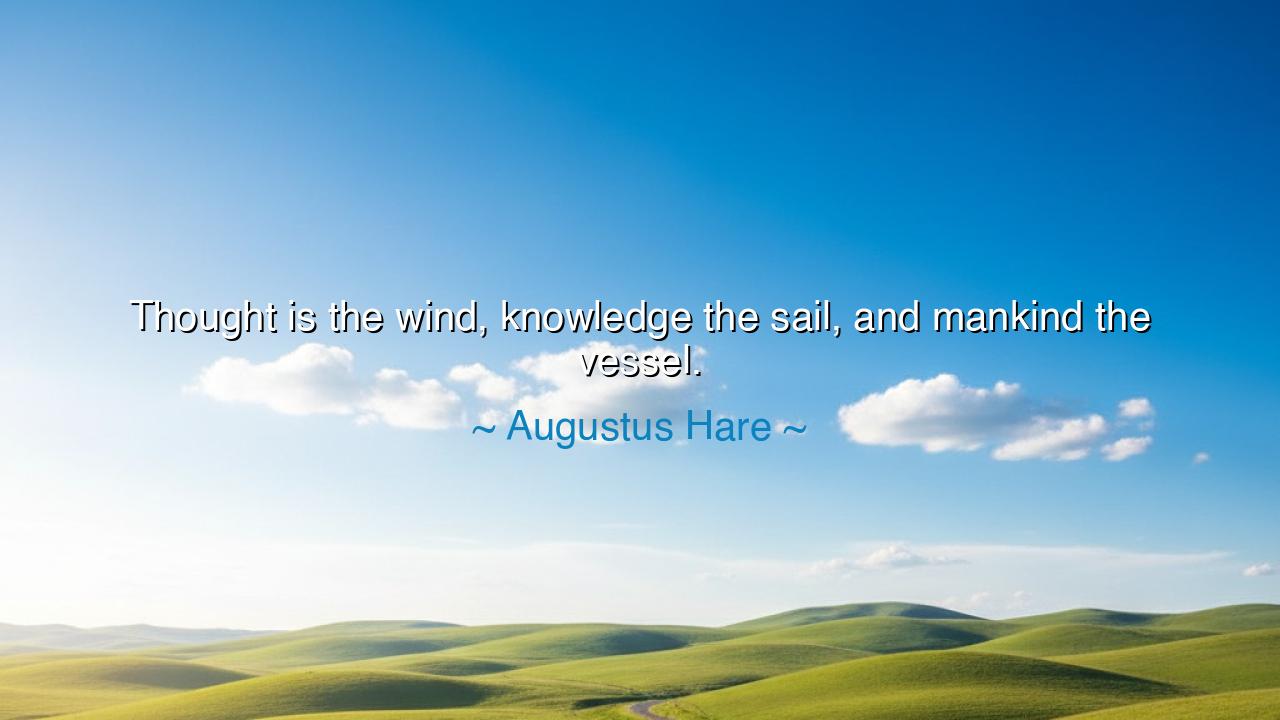
Thought is the wind, knowledge the sail, and mankind the vessel.






“Thought is the wind, knowledge the sail, and mankind the vessel.”
Thus wrote Augustus Hare, the English author and moral philosopher, a man who lived in the quiet grace of reflection and the grandeur of intellect. In this single sentence, he captured a truth that unites the realms of mind, spirit, and destiny — that human progress, like a ship’s voyage, depends upon the harmony of three great forces: thought, knowledge, and human purpose. To understand his words is to perceive the mystery of our own becoming — for life, like the sea, is vast and uncertain, and we are all vessels upon its depths.
Hare, a thinker of the Victorian age, was a man who blended faith with intellect. In his writings, he sought to reconcile reason with reverence, and to remind humanity that wisdom lies not in power, but in understanding. When he wrote these words, he was contemplating the voyage of civilization — how humanity, driven by curiosity, steered its course through the winds of thought and the guiding sail of knowledge. For him, thought was the unseen wind — the invisible force that moves the soul, the whisper of inspiration that stirs all progress. Without it, mankind drifts; with it, even the impossible becomes reachable.
The wind of thought is the breath of imagination, the restless current that propels invention, discovery, and art. It cannot be seen or contained, yet its power is infinite. Great civilizations rise upon its gusts — the thoughts of philosophers, poets, scientists, and saints. Consider the Renaissance, born from the winds of free thought after centuries of darkness. Men like Leonardo da Vinci and Galileo let the winds of inquiry fill their minds, daring to imagine beyond the horizon of their time. They did not fear the storm; they welcomed it, knowing that no ship of the human spirit was meant to remain at anchor.
But the wind alone is not enough. The sail of knowledge must catch it — guide it — and turn motion into direction. Thought without knowledge is chaos; knowledge without thought is stagnation. The sail, woven of learning and understanding, transforms mere ideas into purposeful motion. It is education, discipline, and wisdom that give shape to thought’s wild energy. Without the sail, mankind would be tossed by every passing breeze of opinion. With it, we harness the wind’s strength and turn it toward destiny. Thus, knowledge is not the master of thought but its servant — the art by which we navigate the infinite sea of possibility.
And mankind, says Hare, is the vessel — fragile yet enduring, bound to the elements yet free to choose its course. Each of us is such a vessel: born to voyage, to seek, to learn, to endure both calm and storm. Some ships remain in harbor, afraid of the unknown, but the vessel that dares to sail discovers the meaning of its existence. Humanity, too, must not anchor itself in fear or ignorance. It must raise its sails, catch the wind of thought, and move forward by the compass of truth. For every voyage of the soul — whether of an individual or a civilization — is guided by these same forces.
We see this reflected in the life of Christopher Columbus, whose thought — that the world might be crossed by new routes — became the wind that changed the map of the earth. Yet it was his knowledge of navigation, of stars and tides, that made that thought possible. And he himself, as man, was the vessel, bearing both courage and frailty across uncharted waters. His voyage, though flawed and shadowed by human imperfection, remains a living image of Hare’s truth: that all human endeavor begins with thought, advances through knowledge, and is carried by the vessel of the human will.
The lesson, then, is clear: every person carries within them the same instruments of voyage. Your mind is the wind, your understanding the sail, your life the vessel. To drift aimlessly is to waste the power within you; to live deliberately is to set your course with intention. Feed your thoughts with wonder, strengthen your knowledge with discipline, and steer your vessel with courage. The sea of life will not always be calm, but the one who sails with wisdom and purpose will find not fear, but freedom.
So remember, my child of the wind and wave: “Thought is the wind, knowledge the sail, and mankind the vessel.” Guard your thoughts, for they are the breath of creation. Cultivate knowledge, for it gives your journey meaning. And steer your life as one entrusted with a sacred voyage — not to reach the shore in haste, but to honor the voyage itself. For it is upon this sea of thought and knowing that humanity sails toward eternity, and it is the faithful vessel — steady, seeking, and brave — that finds the stars.






AAdministratorAdministrator
Welcome, honored guests. Please leave a comment, we will respond soon